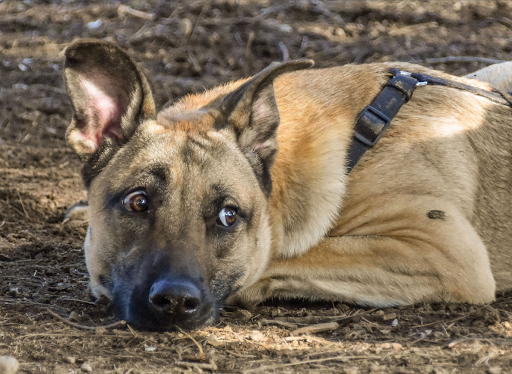Canine Anxiety – How To Help Your Dog

Anxiety in pets is becoming more and more common these days, particularly following Covid when dogs had their owners home all the time and got used to having their undivided attention. Other occasions such as Bonfire Night and stormy nights are also triggers for canine anxiety, so it is important to understand the common indicators and how you can help your dog during these stressful times.
Causes of Anxiety in Dogs
Several different factors cause anxiety in dogs. Sometimes it can be genetic, due to their breed, a lack of socialisation with other dogs, and even pain can be a contributing factor. External environments that can trigger anxiety in dogs include separation from humans or dogs, car travel, noise (fireworks, loud bangs), and traffic while walking them. For dogs that have had a traumatic start to life and have ended up being rescued, even the simplest things like getting their lead out can cause stress and worry.
Symptoms of Anxiety in Dogs
It is important to remember that dogs are individuals and react to certain situations differently. However, there are some key indicators that your dog may be experiencing anxiety:
- Trembling
- Ears pinned back
- Withdrawal
- Lip licking
- Yawning
- Hypervigilance
- Excessive panting
Understanding your dog’s natural body language is really important as this will allow you to easily identify when anxiety creeps in. Some anxious dogs appear extra friendly and will jump up, lick their owner’s face, and be generally a lot needier. Generally, you should watch out for displacement behaviours, which are normal behaviours that occur out of context when a dog is stressed. This could be yawning when not tired, stretching when not stiff, and sneezing when there is nothing bothering the nose.
Helping a Dog With Anxiety
The best thing you can do to help a dog with anxiety is train them! Ideally from a young age, by ensuring your dog gets enough socialisation and exposure to a variety of new harmless situations. This will help them to build positive associations with them and not panic in later life.
For older dogs that are already suffering from anxiety, positive reinforcement training is the best route to go down. If they become anxious in a particular situation, regular exposure without telling them off is really important. Training helps to open up communication between a person and a dog, and will help to improve the bond between you.
Routine is essential in any dog’s life, but particularly those that suffer from anxiety. They need to know exactly what time they are going to receive food, go for walks, have play time, etc. Respect your dog’s needs too – if they are eating, let them eat in peace, if they don’t want to be petted then don’t force it upon them.
Calming An Anxious Dog
Calming a dog that is showing signs of anxiety is entirely dependent on the situation, and there isn’t a one-size-fits-all approach. If your dog has separation anxiety, they need to slowly be introduced to time alone without you. Don’t throw them in at the deep end leaving them for hours on end and expect that to fix the anxiety. Slowly-slowly is the best way for dogs with anxiety.
If your dog is frightened of loud bangs, a really great way to help them is by creating a safe space where they can go if they are feeling anxious. Even crate training can help with this, so your dog associates the crate with being a safe place to sleep if they are scared. Most anxious dogs benefit from positive reinforcement training, as well as consistency in their routines.
Dogs With Chronic Anxiety
It is worth mentioning that dogs with chronic anxiety may not react to any of the tools we have included in this blog. Sometimes veterinarian intervention is needed, just to rule out any pain or discomfort that your dog may be experiencing. If they are given the all-clear medically, then your dog may be offered anti-anxiety medications to help reduce the symptoms.
For tailored advice and training sessions, our expert team at WitsEnd is on hand. Working with people from all over the country, we have had over 2000 success stories! To book an appointment or for more information, please call us on 0116 244 2455.